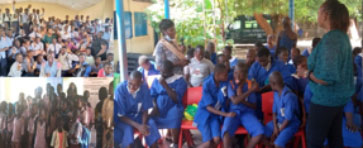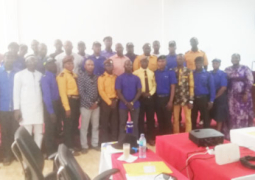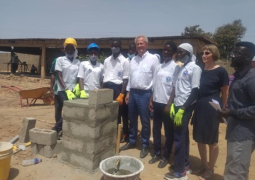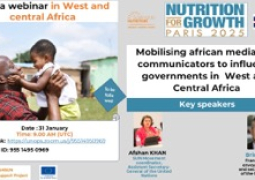
The Special Need and Inclusive Education Schools sensitised included St John’s School for the Deaf, Gambia Organisation of the Visually Impaired (GOVI) School for the Blind and Methodist Special School in Kanifing Municipality.
Students of Special Needs and Inclusive Education schools comprise adolescent boys and girls that are vulnerable and prone to sexual harassment among others as some people take advantage of their conditions.
Addressing the students, their teachers and guidians, Phebian Ina Grant-Sagnia, principal investigator of the project for Strengthening Access to Quality Comprehensive Health Education for in-and-out of School Adolescents in The Gambia who is also Principal Health Researcher Ministry of Health noted that these kinds of schools are made up of adolescents male and female and often times they are victims of gender based violence which include rape, incest among other sexual harassments.
In every school activity, she said, it is very important to include these schools and their students “because they are part of the society.”
In very simple terms, she said comprehensive sexuality education is the right based approaches to transfer knowledge, inform, educate and communicate to adolescents about sexual and reproductive health issues to enable them know how their bodies grow and the changes that occur during puberty.
Musukaba Camara, Head Teacher of GOVI noted among other topics that gender based violence is one of the challenges for GOVI’s students because they are visually impaired which makes them open to violence in society.
She said in the past they did have peer-health education group visiting the school, which is no more available, saying “the only place where these students can have this information is from the erstwhile Family Life Education (PoP/FLE) subject.
She said issues attached to reproductive health are increasing because parents are very shy to discuss violence against their children as regarding rape, molestation or other forms of sexual harassments and their girl children’s menstrual cycles.
Lucy Sarfoe, Head Teacher of Methodist Special School described the sensitisation as very timely saying some of their students are victims with those with babies contemplating of withdrawing or continuing because of some people taking advantage of their conditions to violate them.
“It is timely that students with babies have come back to school and their mates were able to gained from the sensitisation and know how to safeguard themselves,” she expressed.
Comprehensive Health Education (CHE) under the project – Strengthening Access to Quality Comprehensive Health Education in The Gambia is an implementation research project done by the Ministry of Basic and Secondary Education (MoBSE) with funding from International Development Research Center (IDRC). It is meant to enlighten and educate in and out-of-school students on Adolescent Sexual and Reproductive Health (ASRH).
Read Other Articles In National News
In celebration of IYD, BKYDA gears up for annual tree planting exercise
Aug 28, 2020, 11:36 AM




